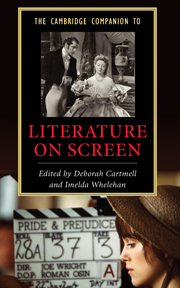Book contents
- Frontmatter
- Introduction - Literature on screen: a synoptic view
- Part One Theories of Literature on Screen
- Part Two History and Contexts
- Part Three Genre, Industry, Taste
- Part Four Beyond the "Literary"
- 13 Classic literature and animation: all adaptations are equal, but some are more equal than others
- 14 High fidelity? Music in screen adaptations
- 15 From screen to text: novelization, the hidden continent
- 16 A practical understanding of literature on screen: two conversations with Andrew Davies
- Further reading
- Index
- Series List
14 - High fidelity? Music in screen adaptations
from Part Four - Beyond the "Literary"
Published online by Cambridge University Press: 28 September 2007
- Frontmatter
- Introduction - Literature on screen: a synoptic view
- Part One Theories of Literature on Screen
- Part Two History and Contexts
- Part Three Genre, Industry, Taste
- Part Four Beyond the "Literary"
- 13 Classic literature and animation: all adaptations are equal, but some are more equal than others
- 14 High fidelity? Music in screen adaptations
- 15 From screen to text: novelization, the hidden continent
- 16 A practical understanding of literature on screen: two conversations with Andrew Davies
- Further reading
- Index
- Series List
Summary
Adaptation from page to screen turns a novel into a soundtrack. In that respect it hands the text over to the composer as much as to the scriptwriter.
The discussion of music rarely plays a major role in novels. In many cases, it is not mentioned at all. Nevertheless, in screen adaptations music is likely to play a significant role: it may be commissioned solely for the adaptation; a collection of pre-existent (or newly composed) tracks may be compiled; or, a producer may choose a combination of both. While our attention may not always be directed towards it, music in films and television programs always affects our experience of the image and narrative in some way, even when not consciously attended to. Think of John Williams's score for Steven Spielberg's 1975 adaptation of Peter Benchley's novel Jaws, for example.
Film and television scoring is both a product and a practice of the “long” twentieth century: an aesthetic and pragmatic response to the development of specific technologies and cultural forms. Of course, music itself is both a cultural product and a cultural practice. As such, musical composition, performance, and reception are subject to the more general transformations of society and culture over time, and those experienced by composers, performers, and listeners. In this way, the discussion of music in classic novels offers intriguing insights into the changing character of perceived relationships between music and society, as an exploration of the BBC's 1995 serial adaptation of Jane Austen's Pride and Prejudice (1813) demonstrates. A discussion of the use of pre-existent music in the screen adaptation of Thomas Mann's 1912 novella Death in Venice follows. First, however, an introduction to music's potential on screen is necessary.
- Type
- Chapter
- Information
- The Cambridge Companion to Literature on Screen , pp. 212 - 225Publisher: Cambridge University PressPrint publication year: 2007
- 3
- Cited by

